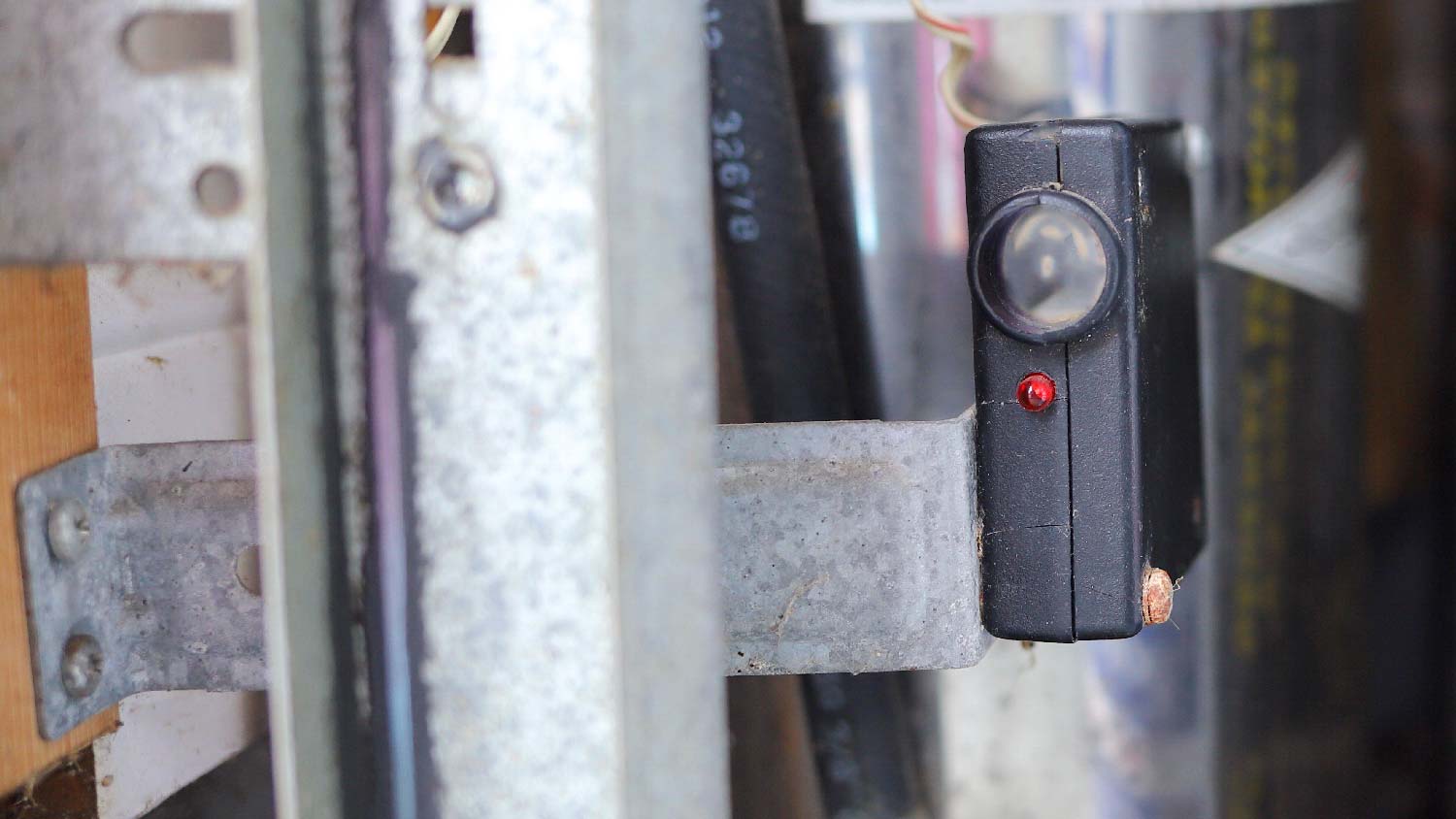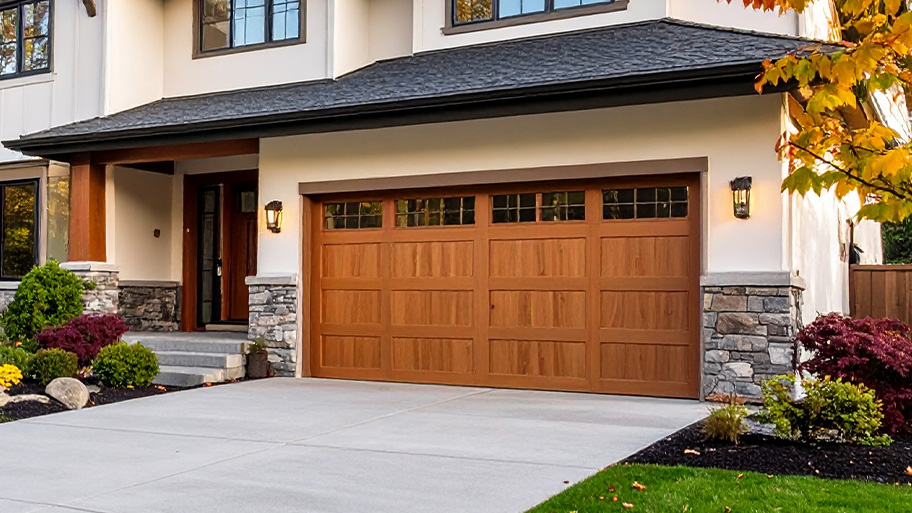
This guide will help you determine the true cost of installing garage door openers. You’ll need to consider type, horsepower, and other factors.
Garage door sensor replacement costs $160 on average, but ranges between $70 and $190, depending on sensor type.


Expect to pay between $30 and $220 for a new garage door sensor.
A pressure garage door sensor costs the most at around $300 per sensor, whereas a contact sensor costs as little as $50 each.
Expect to pay a pro $40 to $110 per hour to replace your garage door sensor.
Considering sensors cost as little as $50, it’s usually better to replace them rather than attempt to repair them.
Garage door sensor replacement costs around $160 on average, though you could pay anywhere between $70 and $190 depending on what type of sensor you want and how long it takes to install. Few DIYable home improvement projects have such a strong effect on safety for such a small amount of money. While the infrared mechanism powering garage door sensors is simple, they can suffer damage due to blockage, loss of power, or simply age. The good news? Replacing garage door sensors is inexpensive and fairly straightforward.
Garage door sensors are great when they work— but a dangerous annoyance when they don’t. If your garage door acts strange when closing or simply won’t close at all, you may not have a broken garage door. All you may need to do is clean or realign your door sensors.
There are a few types of garage door sensors, but most look like two small boxes near the base of the garage door, one on either side, that connect an infrared beam between the two. If anything crosses the beam while the door is closing, it will reverse the door so that it doesn't close on anything—or anyone.
The other garage door sensors are not as common because they are more expensive, both in material costs and installation. However, using one or more together will always be safer than using one single safety mechanism.
| Type of Sensor | Average Cost |
|---|---|
| Infrared safety sensor | $80 |
| Pressure sensor | $300 |
| Contact sensor | $50 |
| Smart sensor | $70 |
The sensor types all function in different ways. Which one you choose depends on both your budget and safety concerns:
Infrared sensor: detects obstructions via infrared beams.
Pressure sensor: monitors weight on the door.
Contact sensor: features a piece on the door and a piece on the wall physically joining, stopping the door.
Smart sensor: is similar to the contact sensor but uses electronic proximity.
Most homes only use the infrared sensor because it's commonly installed when the garage door itself is installed, but certain combinations help to cover all bases. Infrared and pressure sensors combined would be the most powerful (and safest) combination, but they would also be the most expensive. Smart sensors used with infrared would work well but not rely on physical contact points. However, it would be less expensive than using pressure sensors.
Size doesn’t play a large factor in the total cost because the sensor doesn't do any heavy lifting itself. The sensor acts like a remote control, which means a very lightweight piece sending an electronic signal to the garage door motor doesn't need to weigh any different, regardless of whether it’s controlling a 300-pound door or a 30-pound one.
It’s best to hire a garage door professional to install and check the sensors. Expect to pay an hourly rate between $40 and $110 per hour. The good news is this work shouldn't take more than one hour. To save money, make sure you tell your local garage door repair professional the exact model of your garage door motor. This ensures that the sensors and existing electronics are compatible.
The prep work for replacing a garage door sensor is fairly simple. Make sure there's nothing in the way of the sensor path if you're using infrared. The existing garage door should be functioning well with nothing in the way of the door tracks. Clean the area and ensure that if you need an electrical outlet, it functions at the right voltage. Expect to pay anywhere between $1 and $20 for an electrical outlet, depending on the type you need.

Garage door sensors don't require much maintenance other than cleaning off dust and dirt. Check the mounting screws and tighten them every few months or when you notice any movement. One of the nice things about garage door sensors is that they normally only require maintenance when they stop working correctly. This takes a lot of guesswork out of when to check them. That being said, inspect them every three months or so.
Because garage door sensors are relatively inexpensive and function as a pair, it's a better idea to just replace them than attempt any type of repair. Even the physical sensors, when bent out of alignment, are not easy to repair and cost less than $50 to replace entirely.
Replacing a garage door sensor might sound like an easy task, but in reality, this can be quite tricky without the proper tools and knowledge. We always recommend leaving jobs like this to a local garage door opener repair pro, as their knowledge of electronics and garage doors will help complete this project quickly and with better results. At just $40 to $110, these professionals are relatively inexpensive, making them well worth the costs.
Working with a pro on this job has a few benefits to keep in mind, such as:
Ensuring the quick, proper installation of the new sensor
Help diagnosing the issue with the old sensor and preventing it from happening again
Ensuring proper electrical connections to the sensor
Protecting yourself from the security and safety risks of an improperly installed garage door sensor
Get help choosing the right sensor for your needs
There are a few ways you can reduce your garage door sensor installation cost:
DIY the project if you have prior experience and are confident in your ability.
You can also consider upgrading your system with a new motor if it's getting old, as you'll find combining the two together should save you money on both the motor and the sensors.
Choose the least expensive sensors, as long as they’re still reliable.
Discuss the type of sensor that suits your needs with your pro, balancing safety, security, and your budget
Ask if there’s any prep work you can do yourself to make the installation process faster and smoother
Ask if your pro has specific recommendations for future sensor maintenance
Home is the most important place on earth, which is why Angi has helped more than 150 million homeowners transform their houses into homes they adore. To help homeowners with their next project, Angi provides readers with the most accurate cost data and upholds strict editorial standards. We extensively research project costs to develop the pricing data you see, so you can make the best decisions for you and your home. We rely on reputable sources, including the U.S. Bureau of Labor Statistics, academic journals, market studies, and interviews with industry experts—all to ensure our prices reflect real-world projects.
Want to help us improve our cost data? Send us a recent project quote to [email protected]. Quotes and personal information will not be shared publicly.
From average costs to expert advice, get all the answers you need to get your job done.

This guide will help you determine the true cost of installing garage door openers. You’ll need to consider type, horsepower, and other factors.

If you live in a climate that experiences harsh winters and summers, you should consider an insulated garage door. Learn what impacts the costs and how it can help save you money over time.

Replacing a garage door is necessary to add security and value to your home. Learn how each door type affects the total cost of this project in Columbus, OH.

Resetting a garage door opener can secure your home and fix frustrating remote issues. Keep reading to learn how to reset garage door remotes.

Learn how to open a garage door manually in case a power outage or wear and tear stops it from functioning automatically.

Don’t let garage door issues leave you and your car stuck inside. Learn how to fix the 10 most common garage door problems with our tips and advice.